The System That Makes Your Home Run Itself
Your home doesn’t run on willpower, energy, or motivation—those are always in short supply for mothers. It runs on automatic systems—small habits repeated so consistently that they no longer feel like work.
These aren’t “big transformations” or aesthetic Pinterest hacks, not a fussy chart or endless hustle. They’re simple, automatic rhythms that carry the weight of homemaking for you and make your home run like a well-oiled machine, giving you the peace and joy you thought were lost.
As Christian moms, we’re called to steward our homes with love, reflecting the order and peace of our God. Right now, so many of us are carrying the weight of overwhelm, and it’s robbing us of the joy God intends for our homes.
Your home is where your family’s faith and love are nurtured, and these simple habits can make it a place of rest, not stress, so you can do more of what you actually love to do—while also feeling good about the home you’re keeping.
I know some of you are really struggling though, beyond just what simple homemaking systems can solve. And if that’s you—and you’re wondering how I went from barely surviving each day to creating a peaceful, joyful home—even when my circumstances didn’t change—I actually walk through the exact process I followed in my free workshop, From Survival Mode to Peace-Filled Homemaking in 7 Days.
The Four Foundational Habits
Foundational Habit 1: Keeping Jesus at the Center
There is just one habit that will make your whole house feel at peace instantly—and shockingly, it’s a habit that so many Christian mothers neglect: being in the Word.
In 1 Corinthians 14:40, Paul says, “Let all things be done decently and in order.” We serve an orderly God, and our homes should reflect His character. By keeping Jesus at the center—through studying the Word and prayer, and aligning our priorities with His Word—every habit we build becomes an act of worship.
This anchors our relationships, routines, and decisions, creating a home that radiates peace.
But you’re probably thinking, “Okay, that’s nice—but how in the world do I have Bible time when I barely have time to do laundry?!” That’s where the next foundational habit comes in.
Foundational Habit 2: Waking Up Early
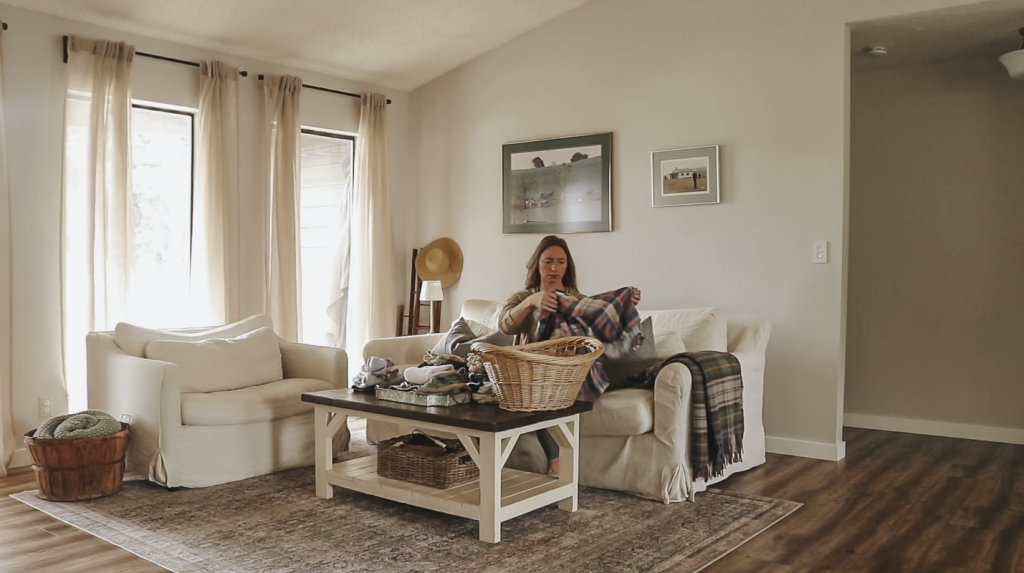
You need to start waking up earlier. Waking up early could give you the breathing room you’ve been craving as a mom.
I know you might have resistance to this because you’re already up multiple times in the night with a nursing baby, or any number of other reasons. But when I tell you that the Lord will give you supernatural energy if you start waking up early to be in the Word—I’m serious.
Personally, I wake up at 4 a.m. by choice, and also because when I do I feel SO much better—but that’s not necessary. Waking up just 30 minutes before your children will give you the peaceful start to your day you crave.
Waking up early—whether it’s 4 a.m. like me or just 30 minutes before your kids—gives you space to pray, plan, and set the tone for the day. At first it might feel like a struggle, but before long, it’ll start to feel automatic and will become the foundation for everything else.
Foundational Habit 3: Habit Stacking
For example, if you already make coffee every morning, you can stack the habit of unloading the dishwasher while it brews. Or if you already tuck the kids in at night, you can stack the habit of doing a five-minute tidy right after.
The anchor habit is strong—it’s already running on autopilot—so the new habit naturally tags along.
This is the secret to making your home run smoothly without constant decision fatigue. You’re teaching your brain to do the things that serve your family almost subconsciously, until they become as natural as brushing your teeth.
When you master habit stacking, your home begins to carry its own rhythm. You’re no longer trying to remember every little thing, because your habits are working together—automatically.
Foundational Habit 4: External Brain
The next foundational habit is to stop keeping so many tabs open in your brain by implementing some sort of external brain.
I used to struggle with so much brain fog when I was living in a constant state of survival mode, so I relied on external brains like my planner, meal plans, and Trello to hold all the mental tabs.
This habit alone cuts overwhelm by keeping your mind clear and your day intentional.
The Home Management Habits
Habit 5: Automatic Laundry Habits
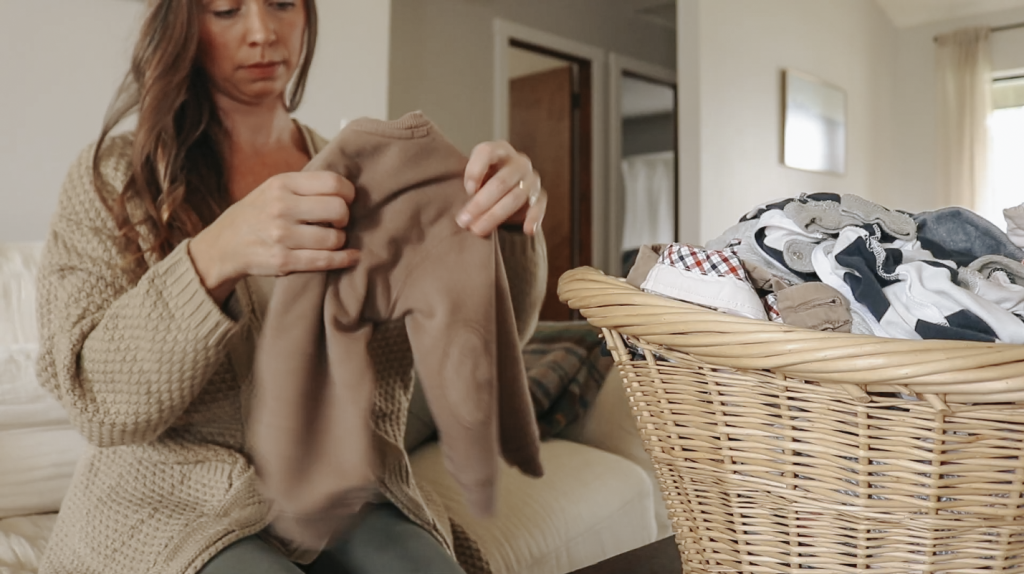
Through habit stacking, I’ve made one of the biggest stressors for homemakers second nature—laundry.
Here’s my routine: every day after I clean the dishes, I put the dirty dish rags in the washing machine and start a load of laundry. By the time I’m ready for bed, I switch it to the dryer and it’s ready for folding the next day.
I don’t usually keep laundry in baskets except for the light load. I just put all the darks, including rags, into the washer instead of a laundry basket, and then start it at the end of the day. Then I fold the next morning.
Habit 6: Rotating Meal Plans
Meals: six-month rotating meal plans. I actually sell my exact seasonal six-month rotating meal plans, but this is what I’m usually doing for meal planning so I don’t actually have to meal plan.
All I have to do is buy the food and make the food! Shopping lists and recipes are already created, so I don’t have to do anything other than cook.
Habit 7: Protein Habit
Once a week, I pull out meat and put it in a big container in the fridge. I look at my meal plan for the week, note all the proteins, then go to my garage freezer and go shopping for meat. What a blessing.
Habit 8: Next Meal Habit
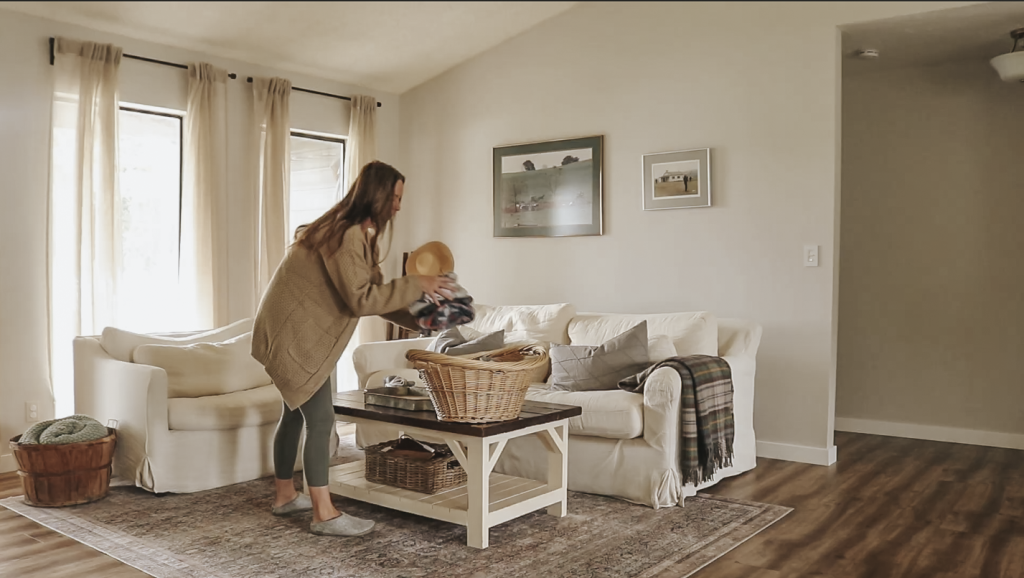
When I’m cooking dinner tonight, I’m already thinking about tomorrow’s meal. Do I need to soak rice, start sourdough, or prep ingredients?
This also includes preparing for the very next meal—like breakfast the following morning.
Habit 9: Prep Dinner at Breakfast
Lastly, I always start dinner at breakfast. However I can move the needle on dinner as early as possible, I do it. That way, come dinner time, all I need to do are some finishing touches.
Habit 10: Tidying Habit
A messy house can be so overwhelming.
Everything in my house has a home—baskets, bins, and closets make it easy. I tidy at three anchor points: before leaving the house, before nap/quiet time, and before bed to “put the house to rest.”
These habits keep chaos at bay, creating a nurturing environment that reflects God’s order.
Habit 11: The One-Chore-a-Day Rule
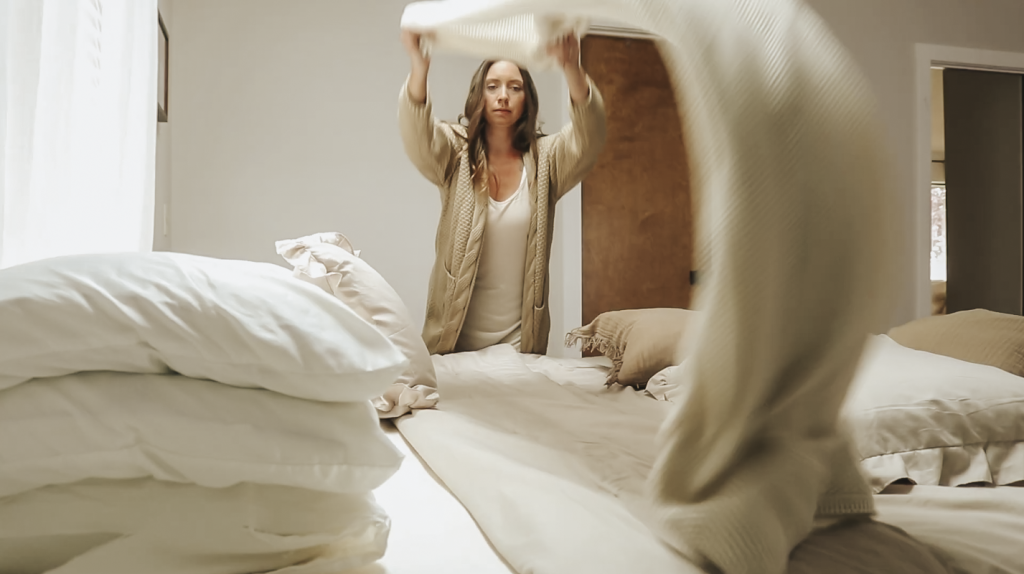
Cleaning feels overwhelming when it’s all at once, but what if you could keep your home sparkling with just 30 minutes a day?
I assign one cleaning task per day—bathrooms one day, floors another—so I’m never cleaning more than 30 minutes. Daily tasks like dishes and trash are non-negotiable, but spreading out the rest keeps my home peaceful without exhausting me.
Habit 12: Lightening the Load
So many moms feel drained because their days are filled with tasks that steal more than they give. But imagine if you could shift your focus toward the things that fill you up—while still keeping your home humming along.
The Four Filters
Share: Give age-appropriate tasks to your children so they learn responsibility.
Simplify: Swap out hard tasks for easier solutions, like grocery delivery or paper plates.
Store Up: Spend a little extra effort now to save energy later—like bulk cooking or prepping breakfast.
Savor: Pour your energy into the work that brings joy—baking bread, family traditions, creating a cozy home.
When you practice this, you stop pouring all your strength into chores that drain you and begin investing it in homemaking that brings peace.
Habit 13: Family Participation (Train Children in Micro-Habits)
If you want a house that runs itself, train the crew to run it with you.
My children have tiny, age-appropriate tasks that I intentionally trained them on through repetition. After a while, they became automatic: putting shoes away, toys where they go, making beds, dressing themselves.
Now, my 4-year-old wakes up, gets dressed, makes his bed, fills his and his sister’s water bottles, takes the laundry out of the dryer, and puts the basket on the coffee table before breakfast.
Start with one micro-habit per child, give lots of praise, and make the routines consistent every day. Then build on those habits once they’re mastered.
Habit 14: Create Margin with Sabbath Rest
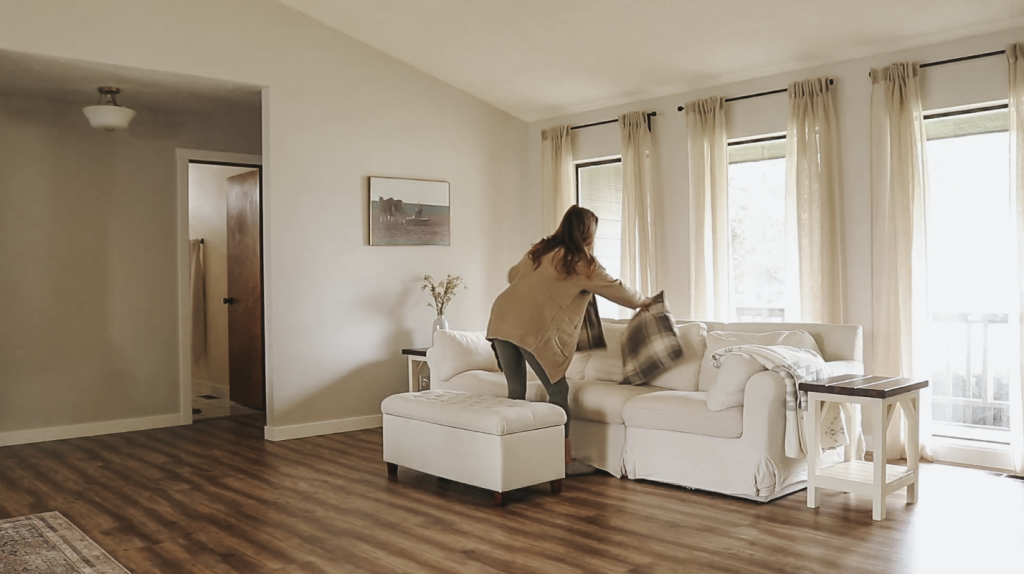
The system needs time to breathe, reset, and relax. You aren’t a robot who can just keep going non-stop—you need margin to rest and reflect.
Each week I take a day where I don’t do any heavy lifting around the house and just do things that bring me and my family joy and rest. Every month I take a full rest week. I return to home management refreshed, not ragged.
Block at least one day a week and/or one week a month as a reset. No heavy projects—just small catch-ups and things that bring you joy.
Make it a Sabbath for your whole family—slow meals, a long date with your husband—this margin keeps the system sustainable.
Coming Home to Peace
This is the exact system I still use to create a peaceful, joyful home—even in the chaos of raising little ones. If you feel like you’re stuck in survival mode, it’s not too late. You can feel calm, present, and in control again. I walk through it all inside my free workshop, From Survival Mode to Peace-Filled Homemaking in 7 Days.


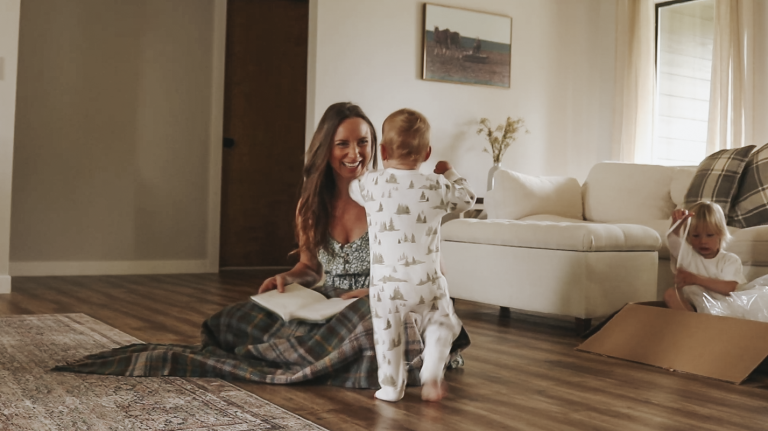





Oh sweet friend, you must have clicked the wrong link – do let me know if any links to the free workshop lead you anywhere except this page, but this is indeed, FREE – just put your email in and it takes you DIRECTLY to the workshop (a new page will load – also the link will be emailed to you): https://transformedhomemakerssociety.com/free-workshop-sign-up/
At 70+ years old I have been doing these steps for decades and I can promise whether you are a Christian, Muslam, or Pagan, this works. The first step really is the most important. Whatever your belief structure this is where you start to find peace, and you deserve to have a peaceful home.